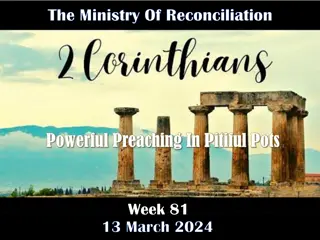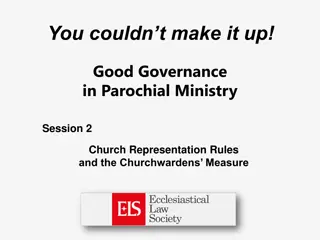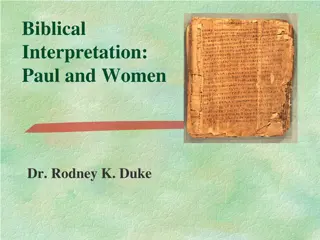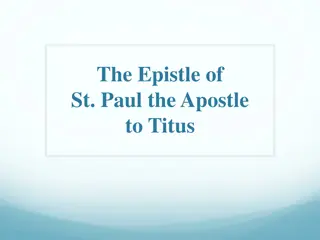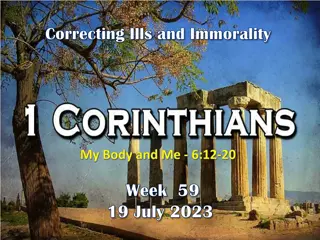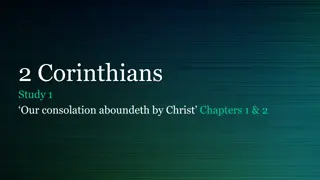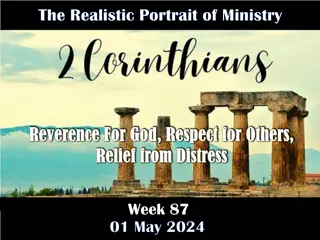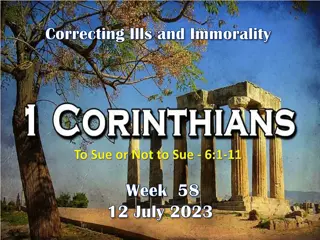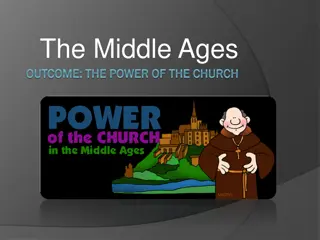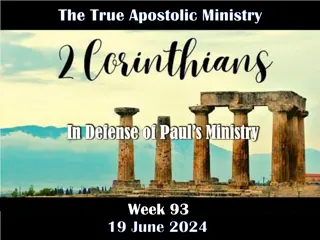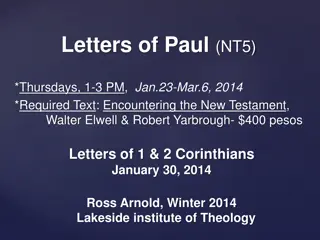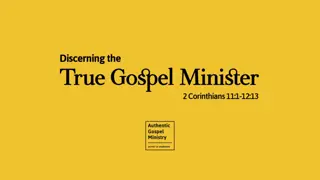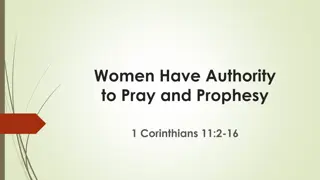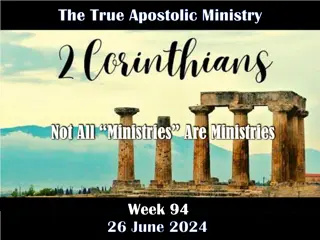Insights into the Church of Corinth and Paul's Letters in 2 Corinthians
The city of Corinth, a hub of commerce and diverse cultures, housed one of the significant early Christian churches. Paul's interactions with the church, including the divisions and his letters, reveal a complex and evolving relationship. The background of Corinth, the founding of the church, divisions within it, and Paul's ongoing concerns as depicted in 2 Corinthians offer valuable insights into the early Christian community and its challenges.
Uploaded on Sep 28, 2024 | 2 Views
Download Presentation

Please find below an Image/Link to download the presentation.
The content on the website is provided AS IS for your information and personal use only. It may not be sold, licensed, or shared on other websites without obtaining consent from the author.If you encounter any issues during the download, it is possible that the publisher has removed the file from their server.
You are allowed to download the files provided on this website for personal or commercial use, subject to the condition that they are used lawfully. All files are the property of their respective owners.
The content on the website is provided AS IS for your information and personal use only. It may not be sold, licensed, or shared on other websites without obtaining consent from the author.
E N D
Presentation Transcript
2 Corinthians The God of All Comfort
Introductory Remarks Where are we?
Context of 1 Corinthians Location: Greece
Corinth On a strip of land between two a gulf and a sea. Ships were taken by land, to avoid having to go around southern Greece. A place of great commerce. Had been established in Ancient Greece, but demolished in 146 B.C. Re-founded under Julius Caesar as a Roman colony in 44 B.C. Greeks, Romans, Jews, and Asians lived there. By the time Paul arrives, Corinth has the largest pop. in Greece. At the center of the city was a bronze statue of Athena, and a temple of Apollo. On the hillside was the temple of Aphrodite.
The Founding of the Church Many religious societies of worship of the gods, and a co-mingling of mystery religions, including Gnosticism, the cults of Isis and Mithra. Paul initially went to the synagogue, but did not succeed in making as many converts there as he had in other churches. The church was primarily a Gentile church with fewer Jewish members. Claudius had expelled the Jews from Rome, and some settled in Corinth, including Priscilla and Aquila. They become strong associates of Paul. It becomes one of the most important churches in the early church period.
When Paul establishes the church, he stays 18 months. There were other leaders, including Apollos. He is an Alexandrian. We are told by Acts that some of his faith needed to be corrected by Priscilla and Aquila. He knew only the baptism of John. Peter also seems to have some influence on the church. (Cephus) There are other factions.
Divisions in the Church Three factions, then. Followers of Paul, Apollos, and Cephus. Apollos Wisdom Cephus---conservative on Jewish law But other factions also exist, as we discovered throughout the book of 1 Corinthians Perhaps we have entered a very difficult period when all sorts of issues have Christians estranged from each other.
Context of 2ndCorinthians By the time Paul wrote 2 Corinthians he had been deeply concerned for the church there for a number of years. His concern continues. After establishing the church (again, where he stayed 18 months), he wrote to them on several occasions. Not all of this correspondence has survived. This makes these letters and 2ndCorinthians a bit of a puzzle. Even before the book of 1stCorinthians he wrote a letter. In between 1 & 2 he wrote another letter that is lost to us. Part of the disagreement between Paul and the church was Paul s promise to visit them twice during his trip to Macedonia. He only came once. They were angry with him (to put it mildly).
On the visit he does make, it was not a happy occasion either for him or church. After he left he wrote a strong and angry letter to them. This is known as the intermediate, severe, painful, or tearful letter. This is not 2ndCorinthians. After Paul died, it seems that the Corinthians gathered together all his correspondence; therefore it is possible that 2ndCorinthians is parts of different letters! Scholars question whether chapters 10-13 are a part of 2ndCor. or another letter. The beginning of 2ndCorinthians is a rare ease in the tension. Clement writes a letter to the Corinthian church at the end of the century. They still have divisions and fighting going on!
2 Corinthians: 3-11 There are two themes in these verses. 1. Comfort in affliction 2. A specific instance of Paul s suffering for the Gospel The nature of suffering. There is suffering that comes from being human. There is suffering that comes from representing the Gospel.
We ask the reason WHY we suffer (called theodicy). Paul never does. Rather, he asks and answers the reason HOW, how do we endure it. Paul knew that every time he suffered for the Gospel, he would be comforted, and that the comfort was stronger than the suffering was terrifying. Key: This comfort is not the removal of suffering not the assurance that everything will turn out alright in the end, nor that it will be over soon (this is such a widespread misconception). The truth is that some of these things may never happen.
But, when Paul describes the terrible things that have happened to him, he calls the comfort he receives life from death. The same God of salvation is the God of comfort. This comfort is life-giving. It assures us of God s close presence with us as we suffer, even if we are not aware of it. So how do we endure suffering? We do so in the power and grace and peace that can only come from God, through the Holy Spirit. Vs. 9b is key: This happened that we might not rely on ourselves but on God, who raises the dead ! The comfort Paul receives, he shares with the church. The comfort they receive they share with Paul. Comfort is NOT to be a solitary affair. We comfort each other with the comfort we receive from God. No one should be alone in their suffering. This is one part of the mission of the Church. AND, this mutual ministry can overcome division!!!




